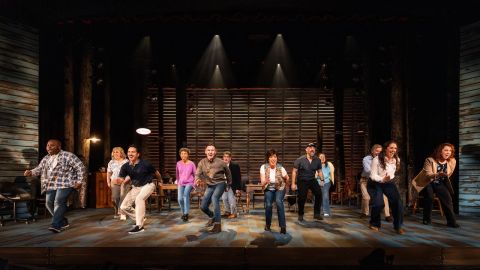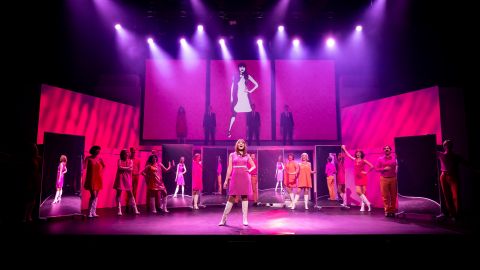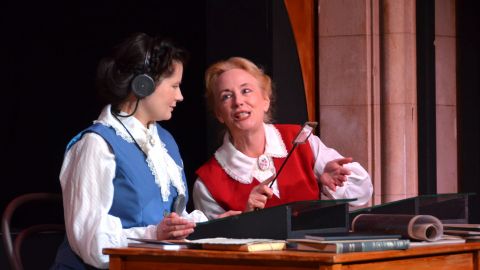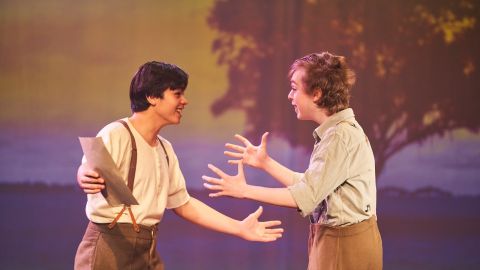Chorus! take centre stage
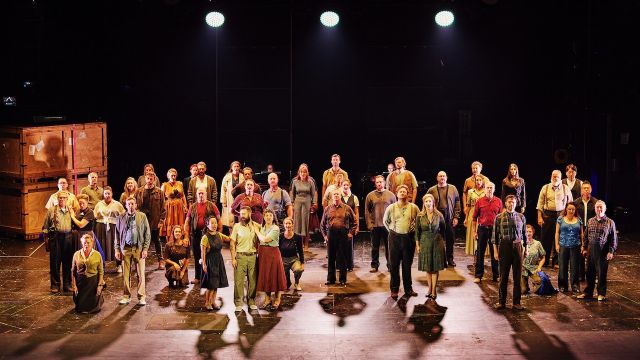
The chorus of a musical or opera is usually in the background - but Opera Australia is giving its ensemble a chance to shine in a new concert work called Chorus! David Spicer spoke with OA’s Chorus Master Michael Curtain and pianist Kate Johnson about the challenges of creating and accompanying a great ensemble.
Michael Curtain has been Assistant Chorus Master and Children’s Chorus Master at Opera Australia since 2016.
David Spicer: How many productions a year does a typical member of the OA Chorus undertake?
Michael Curtain: This year, our full-time chorus is performing in 10 staged productions, and 4 concert performances in Sydney, Melbourne, and Brisbane. This is a rather typical year at OA, although this year we are doing more concerts than normal. The beauty of having the only full-time chorus in the country is that the opera company can program chorus operas regularly.

DS: Describe a typical busy week of rehearsals and performances for them?
MC: Now we are nearing the middle of our summer season, so we have two operas that we have opened, and are in production for two more this week. Typically, we will have shows on Tuesday nights through to Saturday nights, usually with a matinee on the Saturday as well. This means we can come in for one music or production rehearsal on days where there is a show in the evening, and if there isn’t we can do two rehearsals on that day.
DS: What qualities does someone need to get a coveted full-time position?
MC: Other than being a highly skilled and trained operatic singer, we look for voices that have the capacity to blend in an ensemble. This is a very important skill to have as a chorister, not to mention other important factors like stage experience musically and dramatically. Usually when we employ people to be full time choristers, the candidate will have had extensive experience as a casual chorister with us, so we know they will be a good fit. Collegiality is very important when a busy schedule means they spend a lot of time together!
DS: How often are auditions held?
MC: We would normally hold general auditions which are for extra choristers about three or four times a year, across Melbourne and Sydney.
DS: Tell us about the program for the new production of Chorus!
MC: This production includes some of the very best music written for chorus throughout the operatic repertoire. A lot of these we perform quite regularly at Opera Australia, for example the "Moon Chorus" from Turandot, the "Anvil Chorus" from Il Trovatore, and the "Humming Chorus" from Madama Butterfly. Just last year we performed all three of those operas. We’re also including operatic gems that we don’t get to perform that often like choruses from Tchaikovsky’s Eugene Onegin, the "Pilgrims Chorus" from Wagner’s Tannhäuser, and the final scene from Bernstein’s Candide. We also can feature some solos from the immensely talented singers we have in our Chorus throughout the program.
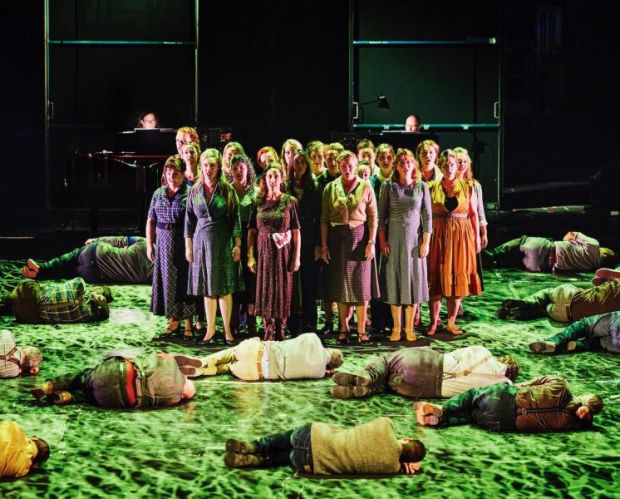
DS: Which Operas do you think have the most exciting choral numbers and why?
MC: I would say the most exciting chorus operas to perform are the big ones like Verdi’s Aida, Puccini’s Turandot, Wagner’s Lohengrin, and other large scale works which provide the chorus and principals the opportunity to just get out there and have a big ole sing as a group across a large orchestra. There is nothing quite like having that wall of glorious sound hit you in the theatre, or even the rehearsal room. It is quite an emotional experience to be around that kind of sound that the human voice can make. Another good example is when we have the opportunity as a group to make the most delicate sounds where you can’t distinguish one voice from another, and you barely even notice when the sound starts! I’m extremely lucky to work with such a versatile chorus, that has an incredible range of musical possibilities.
DS: Which Operas are the most difficult for chorus members and why?
MC: We have recently conquered the Everest of chorus operas, Wagner’s Lohengrin. which we performed in Melbourne last year. I think I can safely say that this work has the most music in it for chorus in the repertoire to date. So preparing, memorising, and performing this was an incredible feat of endurance for our chorus and Melbourne extra chorus, which they performed marvellously!
DS: Do members of the chorus deserve to be the stars of the show more often?
MC: I may be a little biased in answering this, but I believe they’re always the star of show, whether they have a small role or have an entire show created for them! As I said previously, with such a versatile chorus that has such an immense range of colours and dramatic capability, we have a great capacity to be the highlight of any performance.
Répétiteur Kate Johnson has worked as a pianist for Opera Australia since 1995.
David Spicer: To get your role I imagine you would have to be a highly qualified pianist – tell us a little about your journey to get to OA?
Kate Johnson: I started lessons when I was six, but did not really find Opera until I was a teenager, thanks to my wonderful piano teacher. I studied at the Conservatorium in Sydney in the early 90s, and then continued my studies over in London. I was about to make the decision to stay there, when I was offered a position as a trainee répétiteur at Opera Australia. In my early years with the company I had the opportunity to develop my skills back in London, and in Paris and the US, which was invaluable. It is lovely to still be a part of Opera Australia after all these years.
 Photographer: Prudence Upton.
Photographer: Prudence Upton.
DS: Can you be a brilliant pianist and not a good sight reader?
KJ: I think most brilliant classically trained pianists would not have reached that point without some pretty good sight-reading skills. Depending on the type of musician they are, they would utilise those skills in different ways - learning new music, playing a long list of auditions, or jumping into a performance last minute. We are always working on a huge amount of music, so sight-reading helps us prepare efficiently. I remember dreading sight-reading at lessons when I was young, so I think the secret is just doing it. A lot!
DS: Surely you are stumped sometimes by something that is thrown at you?
KJ: Singers are usually very considerate about giving us time to prepare anything tricky, but yes, it does happen! That's when we need to rely on the skills of the job - quickly making decisions about an orchestral reduction, working out what they need to hear, what can be left out, identifying tricky areas to watch out for. And remembering to breathe!
DS: How do you help a singer who gets lost or is struggling?
KJ: Working out what singers need in the moment is another important skill. Sometimes it might be a tempo adjustment or bringing out a particular line that will help them re-calibrate. I have also been known to jump several pages in performance to find a singer who skipped ahead unexpectedly! Staying calm and supportive is always the best way to help a singer deal with those moments.
DS: Looking at the canon of opera what music are you passionate about?
KJ: I am lucky to be able to play a wide range of repertoire at Opera Australia, and I am usually most passionate about whatever I am working on at the time. It is difficult not to be passionate about Puccini, Verdi, Mozart... but I also love 19th century French repertoire, Britten, Handel... the list goes on.
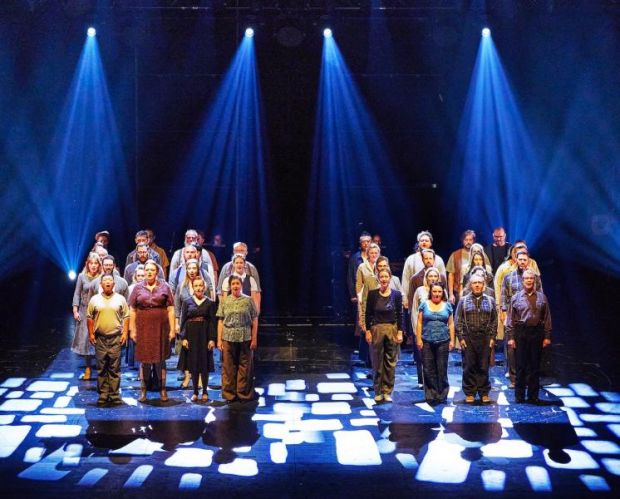
DS: Are composers sometimes naughty and create music that is too difficult to learn or memorise?
KJ: I don't know if it is ever intentional on their part, but I have played some difficult pieces! Some contemporary works can be very difficult to learn and retain. You can only hope the effort is rewarded by a successful performance at the end.
DS: What is an example?
KJ: In 2019 we performed Reimann's Ghost Sonata, which was incredibly challenging for everyone involved to learn and memorise. We spent a lot of time on preparation, and the singers did an incredible job.
DS: What are you looking forward most in the new production of Chorus!?
KJ: I am loving working with our fantastic Opera Australia Chorus, beautifully conducted by Paul Fitzsimon. It is also a rare treat to be a part of a piano duo, and to do this with the wonderful pianist Michael Curtain is such a pleasure. I am looking forward to seeing the reaction of the audience to the incredible sound the Chorus creates - it will be a unique experience!
Chorus! is on stage at the Sydney Opera House until March 10.
https://opera.org.au/productions/chorus-sydney/
All images of the Opera Australia Chorus by Keith Saunders

